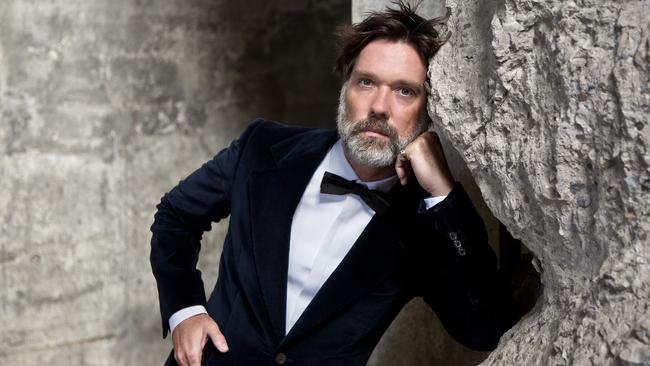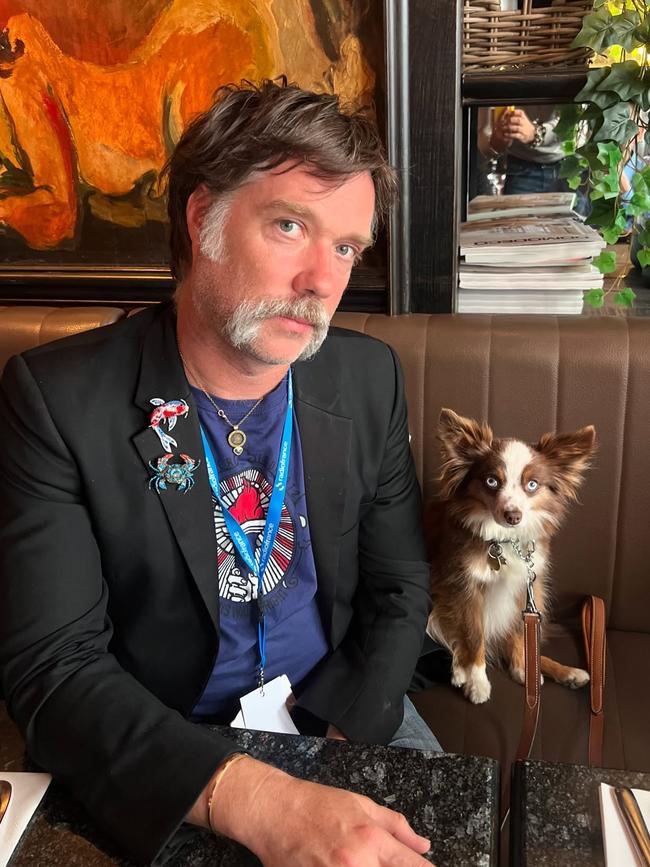Songwriter Rufus Wainwright: ‘I really think I have given Verdi a run for his money’
Brilliant songwriter Rufus Wainwright’s new album is inspired by the death of his dog and features Meryl Streep and Sharon Stone.

Never one to underestimate his own abilities, Rufus Wainwright leans back in his chair, spreads his arms as if acknowledging a standing ovation from thousands, and gives me his appraisal of his 12th and latest album – an epic choral work called Dream Requiem. “I don’t want to sound too egotistical,” he says, “but I really think that with this piece I’ve given Verdi a run for his money. And that’s astonishing because when I first heard Verdi’s Requiem, when I was 13, I felt I was listening to music from the spheres – you know, unattainable. I never thought I would be capable of writing anything like that.”
The Canadian-American singer-songwriter, composer of celebrated numbers such as Going to a Town, Poses, and Cigarettes and Chocolate Milk, has certainly thrown everything into Dream Requiem. There’s a massive orchestra snarling away in a dark, ominous sort of way – then, at the end, dissolving into an ethereal mist in which the most prominent sound is the “ping” of a tuning fork.
There are choruses of adults and children hurling out the Latin requiem text. And there’s a narrator reciting a doom-laden poem by Lord Byron called Darkness. On the album the voice is none other than Meryl Streep.
For Dream Requiem’s tour in 2025, Wainwright, 51, has plucked two other big names from his book of Hollywood contacts.
“We’ve got Sharon Stone narrating in Barcelona and Jane Fonda for the American premiere in Los Angeles in May,” he announces proudly.
“But it doesn’t have to be done by an actor of, um, a certain age. It would be nice to get a young man to do it at some point – Timothee Chalamet maybe – because Byron was a young man when he wrote Darkness.”
Isn’t Wainwright a little young to be writing requiems? “I guess so,” he says, “because when I looked up when Verdi wrote his, he was a good 10 years older than I am. But, you know, life moves much faster these days.”
And Wainwright’s life – enriched, as he freely admits, by an exhausting amount of debauchery in his younger days, including a crystal-meth addiction that almost left him blind – has probably been more frenetic than Verdi’s was. “Yes,” he agrees, “although I’ve always admired the way that Verdi lived life on his own terms. He composed when he wanted to, then stopped when he wanted to and did a little farming. And he had great fashion sense.”
Didn’t Wainwright once dress up as Verdi? “I did,” he replies. “For the premiere of my opera Prima Donna in Manchester in 2009. And my husband (arts impresario Jorn Weisbrodt) dressed as Puccini on the same night.”

Puccini, it transpires, is also an inspiration for the Dream Requiem – though, confusingly, not Puccini the composer. The one commemorated in Wainwright’s new piece is a dog – a miniature Australian shepherd, to be specific, that Wainwright and Weisbrodt acquired, only to witness it being killed by another dog.
“Wait, I’ll tell you the whole story,” Wainwright says. “A few years ago I was asked by people in Athens to write an opera about the 200th anniversary of the Greek Revolution. I knew nothing about the Greek Revolution and they wanted it written in a year, so I said no. But as they were so sweet I said I would do a 20-minute piece instead, perhaps with some sort of contemporary Greek context such as the plight of the Syrian migrants on Lesbos.
“Then a friend said: ‘You know, Rufus, the poet most associated with the Greek Revolution is Byron.’ Initially I thought, no, I don’t want to set some 19th-century poet. I’m done with the past. I’m a young man and want to live for today and write about contemporary things.”
But then Wainwright became curious and decided to Google the words “Byron Greek Revolution” and see what appeared. The first item was the poem Darkness. “I started to read it and I was like, ‘Oh f..k.’ The words just jumped off the page. It was so eerily prophetic. It speaks about environmental catastrophe – of the nothingness of a world without life – as if it was written today.”
It’s certainly a remarkable poem: an apocalyptic vision steeped in biblical imagery and written in July 1816 after a volcanic explosion cast a cloud of sulphur over much of Europe and America, causing the famous “year without a summer”. “I knew I had to do something with those words, even though the Greek project never materialised,” Wainwright says.
“Then Covid came along, and during that time we got the dog. Actually I got it because I saw some TV show suggesting that, during the pandemic when children were isolated, it might be nice for them to have a pet. So I bought Puccini for my daughter, Viva (the child whom he co-parents with her mother, Lorca, the daughter of Leonard Cohen). But actually Viva became very jealous of Puccini, whereas my husband fell in love with him. To be honest, Jorn’s whole life changed because of that dog.” So it must have been shocking when, during a camping trip, Puccini was mauled to death by another dog.

“It was the most traumatic thing that my husband had ever experienced,” Wainwright replies.
And that prompted Wainwright to write the Dream Requiem? “That and the fact that Covid was doing its number on everyone, so it was a very sad time generally.
“Then I re-read the Byron poem and I was like: ‘Oh my god, there’s a dog in that poem too – and it dies!’ So the poem became part of the Requiem.”
Taking Britten’s War Requiem as his basic model ("It’s famous for incorporating poetry and being not totally religious"), Wainwright set to work. “The music came incredibly quickly,” he says. “I grew up in Quebec, which is a very Catholic part of Canada, and I guess that within me was some sort of repository of Catholic guilt, symbolism, fear, love, whatever. And as far as writing big classical pieces is concerned, this isn’t my first time at the rodeo. I’ve written two operas (Prima Donna and Hadrian, about the last day of the Roman emperor). I have some experience in how to achieve orchestral and choral effects.”
So the shadows of Verdi and Britten hang over the piece. But when you listen to it you sense that Wainwright – although the son of Loudon Wainwright III and Kate McGarrigle, two singer-songwriters very much in the folk tradition – has absorbed many other classical influences. I mention Schubert and he nods emphatically. “I love Schubert, and I guess you could hear some Philip Glass in there too, and some bits that are very Mahlerian, and others that reflect my love of Russian choral music. But if there’s one dead composer whose sound I would love to steal if I could, it would be Janacek. His operas could have been composed today.”
And the religious message of the Dream Requiem? Redemption, resurrection, the Day of Wrath – does Wainwright subscribe to all that? “I’m not a religious scholar but it seems to me that the core message of Christianity is pretty great,” he says. “Love thy neighbour, help the poor, have compassion, turn the other cheek, all that stuff. The trouble is, Christianity has been hijacked – in America at least – by fundamentalists and militants. So you’ve got to get in there and remind people about those basic tenets of love and peace.”
Is he exasperated by the way the fundamentalist Christian tradition in America has been weaponised by Donald Trump? “A lot of people view Trump as the second coming of Christ,” Wainwright says. “I want to say to them: OK, you want to talk about the Bible, so what about the story of the Golden Calf? People worshipped the Golden Calf, and that is what’s happening now with Trump. You are under the spell of the devil.”

It must have been doubly annoying for Wainwright, then, when his cover version of Leonard Cohen’s Hallelujah was played at a Trump campaign rally in October. “Blasphemy” was what Wainwright called it at the time. “It was an obscene thing to do,” he now says, “but since then I’ve heard rumblings on the grapevine that Trump is actually a big fan of my version of the song. So perhaps, if the worse comes to the worse, I should go down to Mar-a-Lago and reason with him, before he pushes the button.”
Wainwright’s parents divorced when he was three.
“It wasn’t ideal,” he says. “Divorce was kind of new and popular in the 1970s, and a lot of families were exploded by it without the parents or children knowing how to deal with the consequences or make up for the loss.”
He was raised by his mother and was performing on stage with her by the time he was 14. The most formative person in his life? “Without a doubt,” he says. “She and I were a dynamic duo. A devilish dynamic duo.”
Musically too? “Well my mother imposed a pretty severe palette of what she felt was ‘real’ music,” he says. “And for her, ‘real’ meant things like field recordings of workers singing the Mississippi Delta blues. There was a whole bunch of stuff which she considered trash but which now, as a gay man, I adore. You know, Cher and Bette Midler and Judy Garland and all the more florid, campy arts.
“But I will always be grateful to her for giving me that little barometer called good taste.”
His mother influenced him in another way. Wainwright says she strongly encouraged him to accept an offer from Lorca Cohen, a friend since childhood, that he should father a child with her.
The sadness is that his mother died from cancer at the age of 63 just before her granddaughter was born. Wainwright and his sister Martha sang in her final concert at the Royal Albert Hall to raise funds for a cancer charity she had established.
Wainwright’s first opera, Prima Donna – premiered a year before his mother died – was about a veteran opera singer trying to make her comeback while being manipulated by those around her. How much real life went into that? “Oh, lots,” Wainwright says. “The opera singer was a symbol of many aspects of my life and my mother’s life. And the thing about the singer losing her voice was really about my mother losing her life. I suppose it was a way for me to process gradually losing her without being direct about it. I was so close to her that I couldn’t have written a requiem about her then.”
But now? There’s a long pause before Wainwright replies. “Now I’m a little more weathered, you might say. And it has just struck me that the Requiem is released on January 17 and the 15th anniversary of my mother’s death is January 18. So yes, she’s definitely in this piece too.”
THE TIMES




To join the conversation, please log in. Don't have an account? Register
Join the conversation, you are commenting as Logout